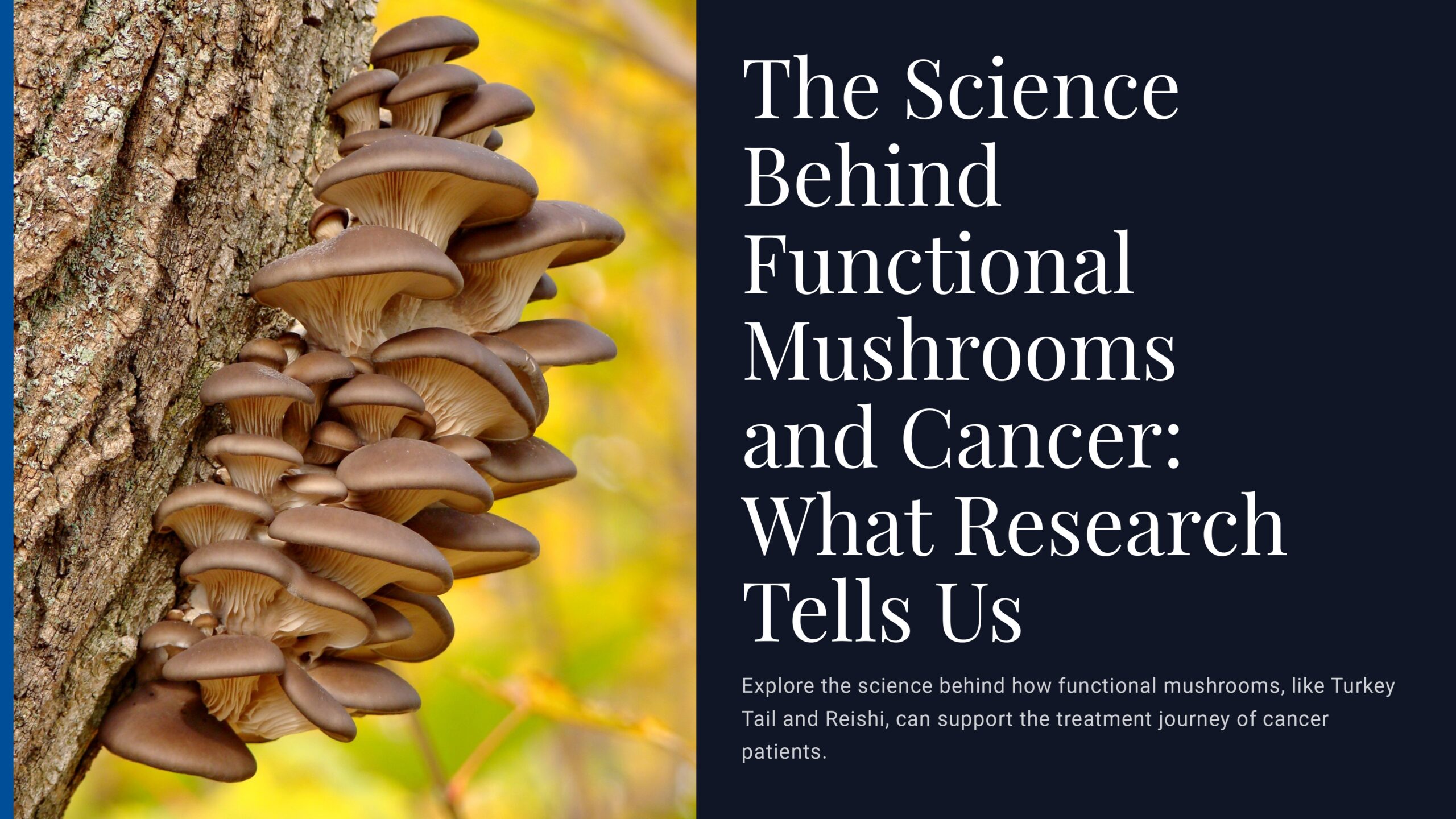Your cart is currently empty!

The Science Behind Functional Mushrooms and Cancer: What Research Tells Us

Introduction to Functional Mushrooms
What Are Functional Mushrooms?
Functional mushrooms are species that offer health benefits beyond basic nutrition. Known for their medicinal properties, these mushrooms have been utilized in traditional medicine for centuries. Recent research has spotlighted their potential role in cancer care, particularly in supporting immune function and improving treatment outcomes.
The Role of Functional Mushrooms in Cancer Care
Cancer treatments, such as chemotherapy and radiation, can weaken the immune system. Functional mushrooms may help bolster immunity and enhance the body’s natural defenses. In this article, we will explore key studies that underscore the benefits of functional mushrooms in cancer treatment, focusing on prominent varieties like Turkey Tail and Reishi.

Key Functional Mushrooms in Cancer Treatment
Turkey Tail Mushroom: Immune Support and Beyond
Turkey Tail (Trametes versicolor) is renowned for its immune-boosting properties. It contains polysaccharide K (PSK), a compound shown to enhance the immune response in cancer patients. A study published in the Journal of Clinical Oncology found that patients with gastric cancer who received PSK alongside conventional treatment had improved survival rates compared to those who did not (1).
Reishi Mushroom: A Multifaceted Ally
Reishi (Ganoderma lucidum), often referred to as the “mushroom of immortality,” has been used for its calming effects and ability to enhance immune function. Research indicates that Reishi may inhibit cancer cell proliferation and induce apoptosis (programmed cell death) in various cancer types. A study in Cancer Immunology, Immunotherapy highlighted Reishi’s ability to enhance the activity of natural killer (NK) cells, which play a crucial role in immune defense against tumors (2).
Mechanisms of Action
How Functional Mushrooms Work in the Body
Functional mushrooms exert their effects through various biological mechanisms. They contain bioactive compounds, such as beta-glucans, which modulate the immune system by enhancing the activity of immune cells like macrophages and NK cells. This immune modulation can help cancer patients better tolerate treatments and reduce the risk of infection (3).
Synergistic Effects with Conventional Treatments
Functional mushrooms can complement traditional cancer therapies. For example, a review published in Integrative Cancer Therapies discussed how combining Turkey Tail with chemotherapy could enhance therapeutic efficacy while reducing side effects (4). This synergy is particularly important for patients who experience debilitating side effects from conventional treatments.

Research Insights and Evidence
Summary of Key Studies
Numerous studies have investigated the efficacy of functional mushrooms in cancer care. For instance, a clinical trial found that patients taking Turkey Tail extract during chemotherapy reported fewer side effects and improved quality of life compared to those who did not (5). Another meta-analysis demonstrated that Reishi supplementation led to significant reductions in tumor size and increased survival rates across various cancer types.
Future Directions in Research
While current studies provide promising results, more research is needed to fully understand the mechanisms and long-term benefits of functional mushrooms in cancer care. Future studies should focus on large-scale clinical trials to validate the preliminary findings and explore the potential for new mushroom-derived therapies.
Practical Applications and Recommendations
Incorporating Functional Mushrooms into Your Diet
Patients interested in using functional mushrooms should consult their healthcare provider. Common forms of consumption include powders, capsules, and teas. For instance, Turkey Tail and Reishi supplements are widely available, with recommended dosages typically ranging from 1 to 3 grams per day, depending on individual health needs.
Choosing the Right Mushroom Supplements
When selecting mushroom supplements, quality matters. Look for products that are third-party tested for purity and potency. Choose brands that provide transparency in sourcing and manufacturing processes, ensuring you receive high-quality, effective supplements.

Conclusion
The Promise of Functional Mushrooms in Cancer Care
The research surrounding functional mushrooms offers hope for many cancer patients. With their immune-boosting properties and potential to enhance the efficacy of traditional treatments, mushrooms like Turkey Tail and Reishi represent a valuable complementary approach to cancer care.
Encouragement to Explore Further
As research continues to unfold, patients are encouraged to consider functional mushrooms as part of their treatment journey. For more information on the benefits of functional mushrooms and other supportive therapies, visit the Oncorix Knowledge Hub.

